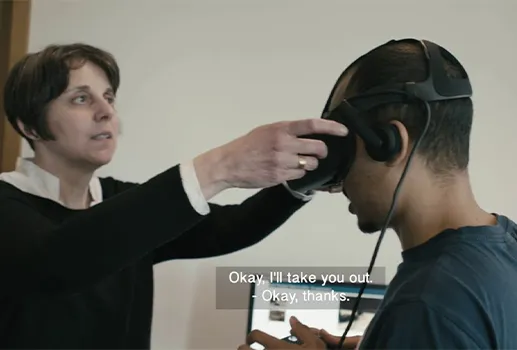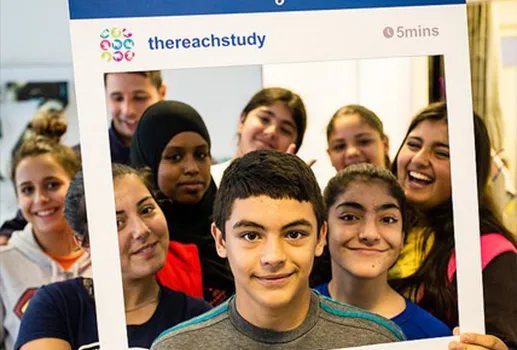09 April 2021
Consultant Clinical psychologist Dr Lucia Valmaggia leads King's IoPPN Virtual Reality Lab - a world leading, multidisciplinary group dedicated to VR based research, assessment and treatments for mental health in young people and adults.
Around 50 per cent of mental health problems in adulthood begin before the age of fourteen. In the UK, 20 per cent of children and 12 per cent of adolescents report bullying at school and many suffer with anxiety - issues that can have a long-term impact on mental health. School presents a window of time to explore the origins of poor mental health in young people and offer early and preventative interventions.

Exploring mental health and resilience in young people
Consultant Clinical psychologist Dr Lucia Valmaggia leads King's IoPPN Virtual Reality Lab - a world leading, multidisciplinary group dedicated to VR based research, assessment and treatments for mental health in young people and adults. The Lab’s work spans VR assisted therapy for psychosis, depression, body image and eating disorders, and VR for unconscious bias training for health professionals, mindfulness and more.
Virtual reality allows Dr Valmaggia and her team to safely expose people to challenging scenarios, provoking similar cognitive, behavioural and physical responses as in real life in a controlled and safe environment. A person suffering from anxiety could be guided through a busy virtual room, learning techniques to help manage their anxiety before applying those coping skills to real life situations.
Dr Valmaggia is particularly interested in how VR can be used to intervene early in the trajectory of mental ill health in young people. Today, the Lab is unique for its focus on young people and is spearheading novel research into resilience training for bullying victimisation, anorexia nervosa and anxiety in adolescents with autism – all using VR, as Dr Valmaggia explains:
‘The majority of people who develop mental health problems experience emerging symptoms in teenage years and young adulthood. VR presents an exciting opportunity to intervene in or prevent mental ill health in children and young people, through its appeal to the younger generation, its portability and cost effectiveness, and the fact we can train non-professionals to deliver VR assisted therapy. Our goal is for VR to be routinely used outside the clinic, in schools and in the home.’

Deploying VR in a unique schools study
Dr Valmaggia collaborates on the REACH study, which aims to find the best ways to promote good mental health in adolescents from diverse ethnic backgrounds. Twelve secondary schools in south London are involved with over 4,000 young people - aged 11-14 - invited to take part since 2016.
The Lab has created a virtual reality canteen specifically for the study, allowing the team to observe how students interpret and respond differently to the same scenario.
The study, led by Dr Charlotte Gayer-Anderson, has found that young people who have experienced three or more interpersonal threatening events - including being physically hit, being the victim of a crime, and experiencing ethnic/religious discrimination - are more likely to experience anxiety and paranoia in a social situation.
With this knowledge, the VR Lab team can better understand the mechanisms that lead to the onset and maintenance of mental health problems and this contributes to the development of useful psychological interventions.
As well as using VR to learn what might underpin emerging mental ill health in adolescents, Dr Valmaggia and team have created a Resilience to Bullying training package and tested this with students in response to evidence highlighting the long-term impact of bullying and the need for new interventions.
The package combines leading psychological research with cutting-edge room-scale VR technology to provide preventative care via a training pack and curriculum for delivery in secondary schools. Young people can complete a series of immersive training and practice responding to bullying – such as receiving distressing messages online - with an avatar to guide them, whose gender and ethnicity they can choose.
This product will be among the first of its kind in the world and Dr Valmaggia and team are looking forward to launching the programme fully. She says:
‘Schools are desperate for digital mental health interventions. They are keen to see if VR products can be a way of creating equity of access to mental health support. This is why our schools work is so important.’
The right VR products
New avatars representative of the diversity of south London were created for the schools work by Jerome Di Pietro, VR Developer at the VR Lab, to ensure characters resonated with students.
Traditionally, there is little diversity within the VR world as avatars used in the gaming industry tend to be based on exaggerated gender stereotypes. This was something the Lab wanted to address, as Dr Valmaggia explains:
‘In response to feedback from young people we have created avatars that reflect the ethnic and religious diversity of south London, and VR settings that are realistic for our target audience. This is crucial if we want to connect meaningfully with the young people who can benefit from VR assisted therapy. Virtual situations need to look credible and not create barriers to engagement because of a lack of diversity. This is why we are growing our ‘library’ of settings and avatars to offer a more personalised VR experience.’
Dr Valmaggia and team are looking forward to developing their schools work further and to relocating to a new, state-of-the-art Lab at the Pears Maudsley Centre for Children and Young People where they will be able to treat more young people with more complex mental health issues. Find out more about the work of King’s IoPPN Virtual Reality Lab here.
